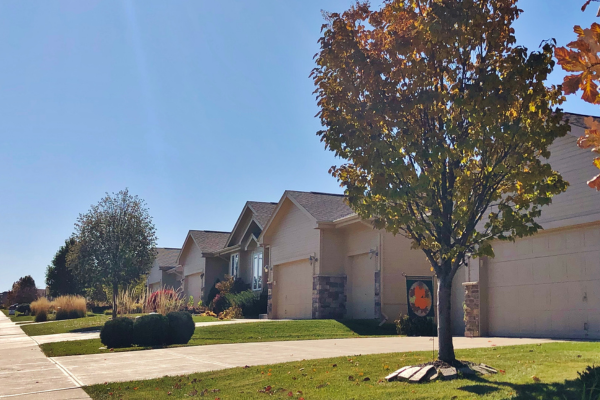What is a Homeowners Association (HOA)?
Introduction
If you’re considering buying a home in a townhome, villa, or condo, you’ll likely come across a homeowners association (HOA). HOAs are common in Omaha, especially in low-maintenance communities where homeowners share amenities and services like lawn care, snow removal, and exterior maintenance.
Understanding how an HOA works—and whether it aligns with your lifestyle—can help you make a confident decision when buying a home. Whether you’re looking for a smaller home, a low-maintenance lifestyle, or simply want access to more amenities, knowing the ins and outs of HOAs is key.
What is a Homeowners Association (HOA)?
A homeowners association (HOA) is an organization that manages and maintains a residential community. When you buy a property in an HOA community, you agree to follow the HOA’s rules and pay regular fees (often called dues) to cover maintenance and shared services.
– Purpose: To maintain community standards and protect property values.
– Structure: Usually run by a board of directors made up of homeowners.
– Focus: Maintaining common areas, shared services, enforcing rules, and managing the budget.
What Does an HOA Do?
HOAs are designed to make life easier for homeowners by handling maintenance and community issues. Common services may include:
✅ Landscaping and Lawn Care – Ideal for those looking for low-maintenance living.
✅ Exterior Maintenance – Roof repairs, siding, and exterior painting in some townhome and villa communities.
✅ Snow Removal – Common in Omaha’s townhome and villa communities.
✅ Community Amenities – Pools, clubhouses, fitness centers, and walking trails.
✅ Insurance and Utilities – Some HOAs cover trash collection, water, and building insurance.
✅ Community Guidelines – Rules about parking, exterior changes, and noise levels.
👉 Related: What to Know About HOA Fees and Rules
Why Do HOAs Exist?
HOAs are designed to protect property values and offer low-maintenance living for residents. They help prevent issues like:
– Unkempt lawns or neglected homes that lower neighborhood appeal.
– Parking disputes and noise complaints.
– Maintenance gaps that lead to deteriorating shared spaces.
For many homeowners, the benefit of having a governing body handle these issues outweighs the potential restrictions.
Types of HOA Communities
Different types of properties are often managed by HOAs. Knowing the differences can help you choose the right fit:
🏡 Single-Family Homes in HOA Communities
– Common in master-planned neighborhoods like **Sterling Ridge** or the new **Boystown – Heartwood development**.
– May include access to walking trails, pools, and shared green spaces.
– Often appeal to families and early retirees.
🏘️ Townhomes
– Similar to duplexes or triplexes with shared walls but private entrances.
– Typically more affordable than villas or single-family homes.
– Ideal for busy professionals or those seeking a lock-and-leave lifestyle.
🏠 Condos
– Multiple residential units with a shared entrance and building maintenance covered by the HOA.
– HOA fees often include building insurance, exterior maintenance, and common area upkeep.
– Popular with young professionals and single homeowners.
🏡 Villas and Patio Homes
– Often found along the perimeter of residential neighborhoods.
– Designed for low-maintenance living with semi-private yards.
– Usually single-level ranch layouts, appealing to empty nesters and mobility-conscious buyers.
👉 Related: The Best Villa and Townhome Neighborhoods in Omaha
Who Runs an HOA?
Most HOAs are managed by:
– Board of Directors – Elected homeowners who make decisions on behalf of the community.
– HOA Management Company – A professional service that handles day-to-day operations, accounting, and reporting.
– Committees – Groups of homeowners that oversee specific issues (landscaping, social events, maintenance projects).
How Much Are HOA Fees?
HOA fees vary based on the type of property and the level of services provided. In Omaha, fees typically range from **$100 to $500+ per month**.
💡 What HOA Fees Typically Cover:
– Lawn care and snow removal
– Exterior maintenance (roof, siding, window washing, decks, painting, etc.)
– Trash and recycling
– Community amenities (pool, clubhouse, etc.)
– Reserve fund for repairs and improvements
How is an HOA Funded?
HOA fees (or dues) can be paid monthly, quarterly, or annually. Sometimes a combination of monthly and annual dues are scheduled to fund specific services.
– Monthly or Annual Dues – Covers routine maintenance, insurance, and shared utilities.
– Special Assessments – Extra fees for major repairs or improvements.
– Reserve Fund – Savings for future repairs and unexpected expenses.
What to Ask Before Buying into an HOA
Before committing to a home in an HOA community, it’s important to dig deeper into the association’s financial health and management practices. Here are key questions to ask:
– How often do HOA fees increase? – Ask about the history of fee increases and any planned adjustments.
– Are there any upcoming special assessments? – Special assessments are extra charges for major repairs or projects.
– Does the reserve fund meet Fannie Mae and Freddie Mac guidelines? – Lenders often require the HOA to have a certain amount in reserves to approve loans.
– Can I see copies of recent board meeting minutes, the annual budget, and the balance sheet? – These documents will give you insight into how the HOA is managed and any potential red flags.
– What’s the process for submitting requests or resolving disputes? – Understanding how the board communicates and handles issues can help you avoid future frustrations.
Asking these questions upfront can help you avoid surprises and feel more confident about your decision.
Common Questions About HOAs
1. Can I negotiate HOA fees?
No—fees are set by the board and apply equally to all members. However, you can ask for a history of fee increases to gauge future costs.
2. Can an HOA prevent me from renting out my home?
Some HOAs have rental restrictions, so it’s important to review the rules if you’re considering using the property as an investment.
3. What happens if I don’t pay my HOA fees?
The HOA can issue fines, place a lien on your property, or in extreme cases, begin foreclosure proceedings.
4. Are pets allowed in HOA communities?
Many HOAs have pet policies that limit the number, size, and breed of pets allowed. Some may also have leash and noise rules.
5. Can I make changes to my landscaping or exterior?
Most HOAs require approval before making significant changes to your yard, exterior paint, or even outdoor decorations.
👉 Check out our complete list of Frequently Asked Questions about HOAs
Is Living in an HOA Right for You?
An HOA might be a good fit if you:
✅ Want a low-maintenance lifestyle.
✅ Value neighborhood consistency and curb appeal.
✅ Appreciate shared amenities like a pool or walking trails.
✅ Are comfortable following community rules.
An HOA might not be the right choice if you:
❌ Want complete freedom over your home’s exterior.
❌ Prefer to manage your own maintenance and repairs.
❌ Don’t want to pay monthly or annual fees.
👉 Thinking about simplifying your lifestyle? Check out these 12 Reasons Now May Be the Perfect Time to Right-Size Your Home
Conclusion
Homeowners associations offer convenience and consistency, but they come with rules and fees that may not work for everyone. If you’re considering a townhome, villa, or condo in Omaha, understanding how an HOA works is the first step toward finding the right fit for your lifestyle.
👉 Next Up: The Pros and Cons of Buying a Home in an HOA

Omaha townhome community with well-maintained landscaping
About the Author: The information about homeowners associations was provided by Brian Carlin with Nebraska Realty, a recognized leader in residential real estate sales and marketing. Brian can be reached via email at [email protected] or by phone at 402-630-9760. With over 23 years of experience helping people buy and sell homes in Omaha, Brian is passionate about real estate and loves sharing his expertise to help clients make informed decisions.
Thinking of buying or selling a home? Reach out today—I’d love to help you with your next move!
